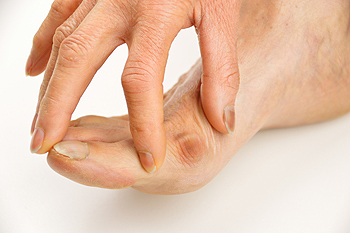1648 US Highway 130
North Brunswick, NJ 08902
 A bunion, or hallux valgus, is a bony bump on the side and base of the big toe. These develop from pressure put on the big toe joint and causes the toe to move out of place and lean inward toward the second toe. Because the big toe carries a lot of weight in standing, walking, and all activities we do, a bunion can cause pain, stiffness, redness, and swelling. Calluses can also form where the big and second toe rub against each other or on the ball of the foot. Untreated, bunions can become worse, and it may be difficult to wear regular shoes or walk comfortably. They can occur on one or both feet. It is rare but possible that children are born with bunions (known as congenital hallux valgus) or develop them later in childhood (juvenile or adolescent hallux valgus). Most often bunions occur in adulthood. They are more common in women, perhaps because of their unique foot anatomy, footwear choices or genetics. Wearing shoes that are too tight, have high heels, or insufficient room in the toe box, and those with some medical conditions (like rheumatoid arthritis) are more prone to developing bunions as well. If you have a bunion that has become uncomfortable, consult with a podiatrist who can provide remedies to restore you to better functioning.
A bunion, or hallux valgus, is a bony bump on the side and base of the big toe. These develop from pressure put on the big toe joint and causes the toe to move out of place and lean inward toward the second toe. Because the big toe carries a lot of weight in standing, walking, and all activities we do, a bunion can cause pain, stiffness, redness, and swelling. Calluses can also form where the big and second toe rub against each other or on the ball of the foot. Untreated, bunions can become worse, and it may be difficult to wear regular shoes or walk comfortably. They can occur on one or both feet. It is rare but possible that children are born with bunions (known as congenital hallux valgus) or develop them later in childhood (juvenile or adolescent hallux valgus). Most often bunions occur in adulthood. They are more common in women, perhaps because of their unique foot anatomy, footwear choices or genetics. Wearing shoes that are too tight, have high heels, or insufficient room in the toe box, and those with some medical conditions (like rheumatoid arthritis) are more prone to developing bunions as well. If you have a bunion that has become uncomfortable, consult with a podiatrist who can provide remedies to restore you to better functioning.
If you are suffering from bunion pain, contact Dr. Robert Fink of Brunswick Foot & Ankle Group. Our doctor can provide the care you need to keep you pain-free and on your feet.
What Is a Bunion?
Bunions are painful bony bumps that usually develop on the inside of the foot at the joint of the big toe. As the deformity increases over time, it may become painful to walk and wear shoes. Women are more likely to exacerbate existing bunions since they often wear tight, narrow shoes that shift their toes together. Bunion pain can be relieved by wearing wider shoes with enough room for the toes.
Causes
Symptoms
In order to diagnose your bunion, your podiatrist may ask about your medical history, symptoms, and general health. Your doctor might also order an x-ray to take a closer look at your feet. Nonsurgical treatment options include orthotics, padding, icing, changes in footwear, and medication. If nonsurgical treatments don’t alleviate your bunion pain, surgery may be necessary.
If you have any questions, please feel free to contact our office located in North Brunswick, NJ . We offer the newest diagnostic and treatment technologies for all your foot care needs.